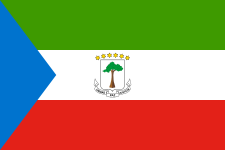Equatoguinean Spanish
Equatoguinean Spanish (Spanish: Español ecuatoguineano) is the variety of Spanish spoken in Equatorial Guinea. This is the only Spanish variety that is official in Sub-Saharan Africa. It is spoken by about 90% of the population, estimated at 1,170,308 for the year 2010[1] (though population figures for this country are highly dubious), all of them second-language speakers.[2]
History
Spanish Guinea (along with the islands of Bioko, formerly Fernando Pó) became a Spanish colony after being obtained from Portugal in exchange for American territories in 1778 under the First Treaty of San Ildefonso. Full colonization of the continental interior was not established until the end of the 19th century. The present nation of Equatorial Guinea became independent on October 12, 1968.

1000 Equatoguinean pesetas banknote from 1969.
While the country has maintained its indigenous linguistic diversity, Spanish is the national and official language. Spanish is spoken by about 90% of the population in Bioko and coastal Río Muni and between 60% to 70% in the interior of Río Muni.[3]
Features
Equatoguinean Spanish resembles more peninsular Spanish from Spain than American Spanish dialects, but there are some differences for those who speak it as second language. Differences often include:
- Omission of articles
- No distinction between the usage of tú and usted.
- No distinction between indicative and subjunctive moods.
- Vosotros and its conjugations are used with no distinction alongside ustedes.
- The preposition en as a marker of destination in place of a (ex: Voy en Bata. vs. Voy a Bata.).
Comparison to the Caribbean dialect of Spanish
According to John Lipski, a comparison between the Spanish spoken in Equatorial Guinea and the Spanish spoken in the Caribbean does not hint at an influence of African languages on the Spanish spoken in the Caribbean, contrary to some earlier theories. Both varieties of Spanish are overwhelmingly different. The main influence in the Spanish spoken in Equatorial Guinea seems to be the varieties spoken by native Spanish colonizers.[4] In a different paper, though, Lipski admits that the phonotactics of African languages might have reinforced, in the Caribbean, consonant reduction already taking place in Spanish from southern Spain.[5]
See also
References
 Languages of Equatorial Guinea |
|---|
| | Official | |
|---|
| | Indigenous | |
|---|
| | Migrant | |
|---|
|
